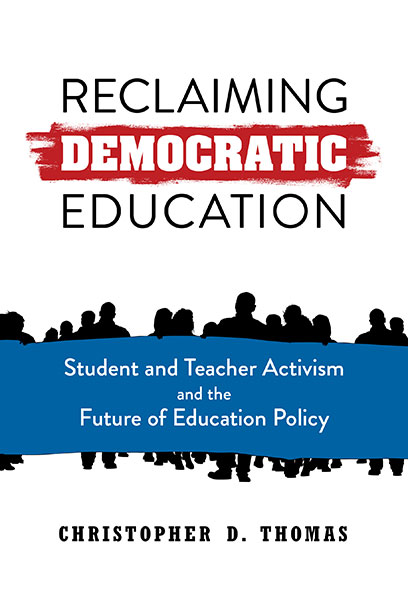Professors: Request an Exam Copy
Print copies available for US orders only. For orders outside the US, see our international distributors.
Publication Date: February 25, 2022
Pages: 160

Since the spring of 2018, hundreds of thousands of students, teachers, and their allies have protested at or against their schools. These students and teachers have been protesting on a wide range of issues, from gun control and climate change to the underfunding of education and institutional responses to the COVID-19 pandemic. In Reclaiming Democratic Education, Chris Thomas examines how these activities exist at the intersection of two conflicting traditions—where student and teacher activism that aligns with the democratic purposes of public education collides with current policies that privilege the economic aims of education and restrict civic agency. By situating contemporary activism within these conflicting traditions, Thomas demonstrates how these activities constitute a rejection of the currently dominant policy paradigm in U.S. education. Thomas concludes with a discussion of how activism provides a foundation from which concerned teachers, school leaders, and policymakers can develop a new model for American education, one that reclaims an education for citizenship.
Book Features:
Christopher D. Thomas is a practicing attorney with Frost Brown Todd LLC, where he represents local school districts and other governmental entities. Prior to practicing law, Chris was a high school English teacher. He earned his JD and PhD in educational studies, specializing in educational policy, from The Ohio State University.
“Thomas shows the possibility of new models to create education systems that present a new way forward. Building on his background in educational policy and law, he provides a context that is accessible to a wide range of readers looking to recover structures for schooling that promote democratic ideals such as deeper collaboration, collective agency, and empowerment.”
—CHOICE
“Reclaiming Democratic Education provides us with an insightful account of the history and current status of both student and teacher activism. It helps to restore our faith in the importance of an education that is truly critical and democratic.”
—Michael W. Apple, John Bascom Professor Emeritus of Curriculum and Instruction and Educational Policy Studies, University of Wisconsin–Madison; author, Can Education Change Society?
Contents
Acknowledgments ix
1. Student and Teacher Civic Activism and the Future of Education Policy 1
The Student Protests of the Spring of 2018 3
The Teacher Strikes of the Spring of 2018 4
Historical Context of Student and Teacher Activism 8
The Political Context of Student and Teacher Activism 10
Organization of the Book 11
2. History of Student Protests in the United States 14
Early Student Protests From the Revolutionary War Through the Late 1800s 15
A Burlesque on Strikes: The First Reported Primary and Secondary Student Protests, 1886 17
A National Trend of Local Protests: Student Protests From 1886–1934 22
Connecting the Local, the National, and the Global: The Student Protest Movements of 1935–1974 28
Business as Usual or the Calm Before the Storm? Student Protests From 1974 to the Parkland Protests 36
3. Teacher Civic Activism in American History 38
A Period of Incubation: Teacher Civic Activism Until the 1940s 39
The Rise of Teachers’ Unions: The Growing Teacher Strikes of 1940 Through the Early 1960s 43
Teachers and the Decade of Protest: The Mid-1960s to Early 1970s 45
Modern Teacher Strikes: Teacher Unions and the Emergence of Neoliberalism, 1974–Present 47
Putting the 2018 Student Protests and Teacher Strikes Into Historical Context 48
4. The A Nation at Risk Paradigm and Student and Teacher Civic Agency 49
Democratic Citizenship as an Aim of Education 51
The A Nation at Risk Paradigm and its Impacts on Student and Teacher Civic Agency 54
5. Understanding Student Protests and Teacher Strikes at the Intersection of the A Nation at Risk Paradigm and the History of Student and Teacher Civic Activism 70
The Improbable Protests: Student and Teacher Activism at the Intersection of Two Conflicting Traditions 72
Out of the Shadows: Embracing Student and Teacher Activism’s Rejection of the A Nation at Risk Paradigm 92
6. Embracing Student and Teacher Civic Agency and Reclaiming “Education for Citizenship” 95
Toward Realizing an Education for Citizenship Paradigm 99
7. The Question Is Not Whether to Respond to Student and Teacher Civic Activism but How 117
References 123
Index 137
About the Author 149
2022 Education Law Association’s Steven S. Goldberg Award for distinguished scholarship in education law
Professors: Request an Exam Copy
Print copies available for US orders only. For orders outside the US, see our international distributors.